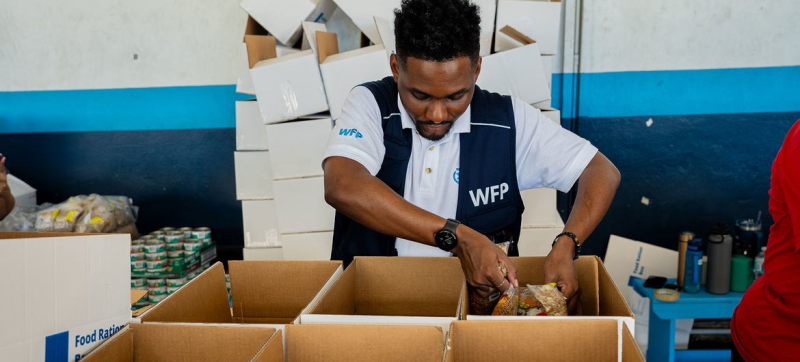- Bangladesh Bank Buys $115 Million to Support Forex Market |
- Tarique Rahman, Daughter Zaima Added to Voter List |
- NCP and LDP Join Jamaat-Led Eight-Party Alliance |
- Tarique Rahman’s gratitude to people for welcoming him on his return |
- Attorney General Md Asaduzzaman resigns to contest election |
Hurricane Melissa Leaves Jamaica Devastated ‘Like Never Before’

Food is packed for distribution to people affected by Hurricane Melissa in Jamaica.
As Hurricane Melissa moved north of Jamaica on Wednesday, the head of the UN team in the country said that preliminary damage assessments from the Category 5 storm revealed a level of devastation “never seen before” on the Caribbean island.
UN Resident Coordinator Dennis Zulu emphasised that the UN remains closely engaged with governments across the region, on-the-ground UN agencies, and the Caribbean Disaster Emergency Management Agency (CDEMA). He noted the “tremendous and unprecedented destruction of infrastructure” across Jamaica, where Melissa made landfall on Tuesday.
Looking ahead to the months-long reconstruction and recovery effort, he told correspondents in New York via video conference that it would take “a lot of resources” to rebuild and restore the country’s economy.
“I don't think there's a single soul on this island that was not affected by Hurricane Melissa,” said the Resident Coordinator.
‘Terrible tragedy’
UN World Food Programme (WFP) Director for the Caribbean Multi-Country Office, Brian Bogart, described the disaster as “a terrible tragedy,” highlighting a “real sense of urgency” on the ground.
“What we're really focused on now is trying to get food and logistics support to enable the entire humanitarian community to respond in coordination with the government,” he said.
Mr Bogart added that the agency’s immediate priority is to deliver 2,000 emergency food boxes ready to be airlifted from Barbados once the airport reopens—enough to support 6,000 people for a week.
As the lead logistical agency, the WFP is also loading a vessel in Barbados from the Logistics Hub operated alongside CDEMA, carrying essential supplies such as hygiene kits, shelter materials, and generators, along with items from other UN agencies and partners to support the humanitarian response in Jamaica.
Hurricane barrels on
Early Wednesday morning, Hurricane Melissa crossed into Cuba, bringing winds of up to 120 mph, heavy rainfall, and warnings of “life-threatening” storm surges, according to reports. The storm is expected to move on to The Bahamas, followed by Bermuda.
Although Melissa weakened to Category 2 upon reaching Cuba, the National Hurricane Centre (NHC) said it would “remain a powerful hurricane when it moves across the Bahamas later today.”
UN Deputy Secretary-General Amina Mohammed called the slow-moving storm “yet another demonstration of climate science and why we must fight for a world at 1.5 degrees Celsius.”
Data from the UN Office for the Coordination of Humanitarian Affairs (OCHA) shows Melissa ranks among the most intense storms to strike Cuba in recent decades, with maximum sustained winds near 138 mph (222 km/h) and two-day rainfall totals approaching 145 millimetres.
On Wednesday, the UN allocated $4 million each to Haiti and Cuba from its Central Emergency Response Fund to help communities prepare for and mitigate the storm’s impact.
According to reports, at least 20 Haitians—including 10 children—have died due to river flooding as Melissa barrelled across the region.
UN working ‘hand in hand’ with authorities
Conveying his condolences to the families of those who lost their lives, UN Secretary-General António Guterres reiterated his solidarity with the governments and communities affected by the hurricane.
“Guided by Resident Coordinators on the ground, the UN is working hand in hand with authorities and humanitarian partners to assess needs, assist those impacted, and prepare in areas that may yet face the storm’s impact,” he said.
UN General Assembly President Annalena Baerbock wrote on X that for small island developing states, “the climate crisis is a lived reality, and the cost of inaction is measured in lives and livelihoods. Adaptation isn’t optional—it’s survival. Solidarity must become sustained, scaled-up climate action.”

